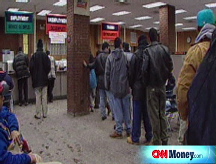Job crisis: Oil ends at a 4 year low
Crude falls below $41 a barrel on fears of slowing U.S. demand after government reports worst monthly job losses since 1974.
NEW YORK (CNNMoney.com) -- Oil ended the day below $41 a barrel Friday - the lowest settlement price in 4 years - after the government reported the largest number of monthly job losses since 1974.
U.S. crude for January delivery fell $2.86 to settle at $40.81 a barrel on the New York Mercantile Exchange. It was the lowest closing price since Dec. 10, 2004, when oil closed at $40.71.
Oil has lost more than $8 a barrel since Monday, and analysts see little on the horizon to quell investors' fears that the world economy will remain slow.
"It's hard to find anything these days that doesn't come out bearish," said Peter Beutel, oil analyst with energy risk management firm Cameron Hanover.
On Friday the Labor Department reported that U.S. employers cut 533,000 jobs in November, the most since December 1974, and indicated that the unemployment rate skyrocketed to 6.7%, the highest since October 1993.
Falling prices: The oil market has been hammered by a series of dour economic reports since the summer, and concern about the resulting decline in demand has sent crude spiraling down more than $100 from a record high of $147.27 a barrel in mid-July.
There aren't many traders left who believe oil prices could pop back up again, according to Steve Brassey, senior broker with Sonic Futures in California.
"I can't remember the last time I bought anything," said Brassey.
On Thursday an analyst from Merrill Lynch predicted crude could fall as low as $25 a barrel in 2009 if the global recession expands to China.
The plummeting price of oil has sent the price of gasoline in the U.S. sliding more than $2 a gallon, as consumers and businesses cut back on expenses. Gas prices declined for the 79th day in a row Friday to a national average of $1.773 a gallon, according to motorist group AAA.
Usually price changes of this magnitude take years to appear, according to Beutel.
"I don't have anything to compare this to. I've been watching oil my whole life," said Beutel.
Weakness everywhere: "Right now we've got a rare simultaneous recession in the U.S., Europe, Japan and the developing nations," he said. "This is a recession in terms of what World War II was to wars - everyone's involved."
A report Thursday showed that new factory orders in the U.S. fell for the third straight month in October, a much larger drop than economists had expected.
As business activity slows, investors worry that the U.S., the world's largest consumer of oil, as well as other countries that have been hit by the financial crisis, will consume less petroleum-based fuel.
Economic problems persist overseas as well, and on Thursday the European Central Bank, the Bank of England and the Swedish Riksbank cut key interest rates to levels not seen in decades.
Meanwhile Swiss banking giant Credit Suisse (CS) said it would eliminate 11% of its global workforce on Thursday. And in the U.S. four major companies - AT&T Inc., DuPont Co., Viacom Inc., and Avis Budget Group - announced job cuts that totaled 17,550
In Asia, Japanese automaker Toyota Motor Corp. (TM) said earlier this week that it would suspend production of Lexus vehicles in its domestic market as demand for vehicles has slowed.
Automakers worldwide have been feeling the heat. On Friday, executives from General Motors (GM, Fortune 500), Ford (F, Fortune 500) and Chrysler continued to plead to Congress for $34 billion in bailout loans in order to avoid bankruptcy.
OPEC: A bullish statement from OPEC President Chakib Khelil failed to stem the tide of negative economic sentiment.
The Organization of Petroleum Exporting Countries, an international trade cartel, controls about 40% of the world's oil exports.
Khelil, who is also Algeria's oil minister, told Algerian television that the group would cut production at its meeting on Dec. 17 if oil remained below $60 a barrel, according to reports.
"As prices continue to weaken, they lose more and more control of the market," said Brassey.
The group chose not to cut production at an emergency meeting last month in Cairo, and decided to defer the decision until December.
OPEC had previously pledged in October to cut production by 1.5 million barrels a day in order to stem the tide of falling prices, but the group has only reduced production by about 725,000 so far, according to production estimates from Bloomberg Finance.
"OPEC will have to take some aggressive action, and take it quickly, to prevent a sub $40 per barrel price handle," wrote Tom Orr, head of research for Weeden & Co. in a note to clients. ![]()




